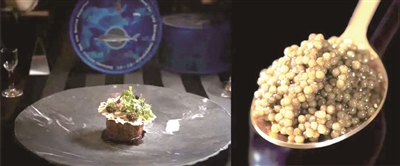
caviar

saffron Photo provided to Hangzhoufeel
Signature products
By Yang Tianfang
As winter snow blankets the northeastern landscapes, hordes of tourists from the south swarm to Harbin, a city celebrated for its unique ice and snow culture and attractions. In addition to the wintry wonders, the genuine local gastronomy has sparked a nationwide craze for specialty exchanges. Notably, Hangzhou, often joked as a "food desert" online, has now unveiled its "hidden treasures" to the amazement of many.
West Lake: Longjing and Jiuqu Hongmei Tea
The West Lake district is celebrated for its venerable tea culture. The world intangible heritage West Lake Longjing tea, with its verdant infusion and refreshing aftertaste, has garnered accolades far and wide. The Jiuqu Hongmei tea, originating and primarily produced in Shuangpu Town, stands out with its unique shape and flavor. When steeped in water, it unfurls like a crimson plum, bringing a warm note to the chilly winter days.
Chun'an: Caviar
Known as "black gold", caviar from Chun'an county, contributing nearly 80 tons annually—encompassing 80% of the Chinese market and 35% globally. Qiandao Lake's pristine aquatic environment has fostered world-class caviar,. Beyond enhancing local cuisine, it has reached international markets. Chun'an is reportedly planning to leverage this distinctive industry to establish an international caviar experience center, further enhancing the brand's global prestige.
Jiande: Saffron
Jiande city's saffron fields burst into color from early November,. Dominating half of China's cultivation area for saffron and producing the majority of Zhejiang's yield, the region has adapted this "red gold" for not just traditional medicinal purposes but also into essential oils and face masks, turning it into something even more glittering and valuable.
Xiaoshan: White Shrimp
The white shrimp of Xiaoshan is another highlight. Over 20 years of development, the district has successfully introduced the South American white shrimp from the Pacific coasts of the Americas and has built the largest breeding base in the country, leading Hangzhou in production. These shrimps have gained acclaim in domestic markets and are exported to over 20 countries and regions, becoming a vital pillar of the local economy.
Tonglu: Monascus wine
The monascus wine of Tonglu County is noted for its historical richness and distinctive taste. The local She minority has maintained the 500-year-old winemaking craft, with households starting production from the tenth lunar month annually. The wine's rich aroma, infused with the freshness of grains, is not only a source of local pride but also becoming one of the new emblems of Hangzhou.
Complementing these are Yuhang's sweet native rice cakes, Qiantang's robust barley wine, Fuyang's paper-thin tofu skins, and Lin'an's thin-shelled hickory nuts--each a vibrant testament to the diversity and splendor of this cornucopia.
